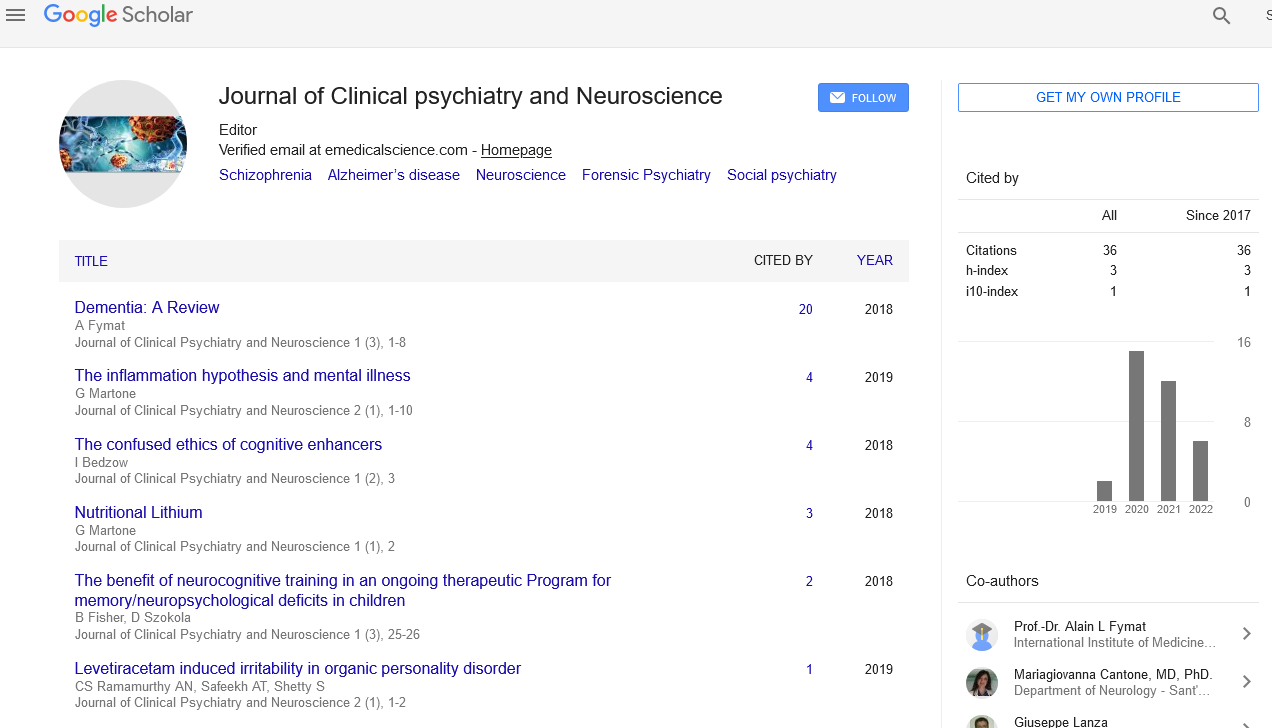Depression and natural therapies: An overview
Received: 08-Sep-2021 Accepted Date: Sep 22, 2021; Published: 29-Sep-2021
Citation: Thapa SK. Depression and natural therapies: An overview. J Clin Psychiatry Neurosci 2021;4(5):5.
This open-access article is distributed under the terms of the Creative Commons Attribution Non-Commercial License (CC BY-NC) (http://creativecommons.org/licenses/by-nc/4.0/), which permits reuse, distribution and reproduction of the article, provided that the original work is properly cited and the reuse is restricted to noncommercial purposes. For commercial reuse, contact reprints@pulsus.com
About the Study
Depression is a common and serious medical illness that negatively affects how you feel the way you think and how you act. Luckily, it is also treatable. Depression is fairly common, affecting more than 15 million adults in the United States. Depression is also the leading cause of disability among U.S. individuals aged 15 to 44 years. With treatment and support, most individuals with depression can fully recover. Eating a healthful diet and partaking in physical activity can make a significant difference to your recovery time, as well as improving your general health. Depression causes feelings of sadness or a loss of interest in activities. Loss of appetite, weight loss, troubles sleep or excessive sleep, loss of energy, difficulty in thinking, feeling guilt, thoughts of worthlessness etc., can be seen in a person with depression.
It is not clear for specific causes of depression, but a widely accepted theory is a change in brain structure and chemistry. Specifically, substances called neurotransmitters are out of balance in depressed people. Possible causes for the imbalance include certain medications, alcohol or substance abuse, hormonal or seasonal changes, or enduring a traumatic event, like being the victim of abuse or losing a loved one or a job. Persistent depressive disorder often begins in childhood, adolescence, or early adulthood and affects an estimated 0.5% of adults in the United States every year. Individuals with persistent depressive disorder often describe their mood as sad or “down in the dumps.” Because these symptoms have become a part of the individual’s day-to-day experience, they may not seek help, just assuming that “I’ve always been this way.”
The above mentioned symptoms must last for more than 2 weeks, depression can be diagnosed. Even other medical conditions like thyroid, brain tumour mimic the same symptoms of depression so it is important to rule out general medical causes. Therapies may include cognitive behavioural therapy, behaviour therapy, psychotherapy, medications etc.
Antidepressants were first developed in the 1950s. In past 20 years, their use increased excessively. These are the most commonly prescribed type of antidepressants. Serotonin and noradrenaline reuptake inhibitors (SNRIs) and Selective serotonin reuptake inhibitors (SSRIs), Tricyclic antidepressants (TCAs), Monoamine oxidase inhibitors (MAOIs), atypical agents. These drugs may include many side effects. Side effects may include hypoglycemia, or low blood sugar, low sodium, nausea, rashes, dry mouth, constipation or diarrhoea, weight loss, sweating, tremors, sedation, insomnia, headache, dizziness, anxiety, abnormal thinking etc.
Along with these medications, there are some natural remedies to reduce depression. They may include, get in a routine, setting goals, going for workouts, maintaining healthy diet, getting enough sleep, meditation, trying to do things which makes mood refreshed. Once getting back to normal after the use of these medications, depression may trigger back sometimes due to some chemical reactions in brain or some other reasons.
Spending time with some loved ones and having some positive talks with them helps in reducing negative thoughts and hopelessness. Not only people around the individual, but also the nature helps in fight with depression. Soothing music, cool breeze, novels that increase our selfconfidence etc. may also help a lot. Some fresh air every day, along with the time to enjoy the nature can reduce this reverting back of depression.





